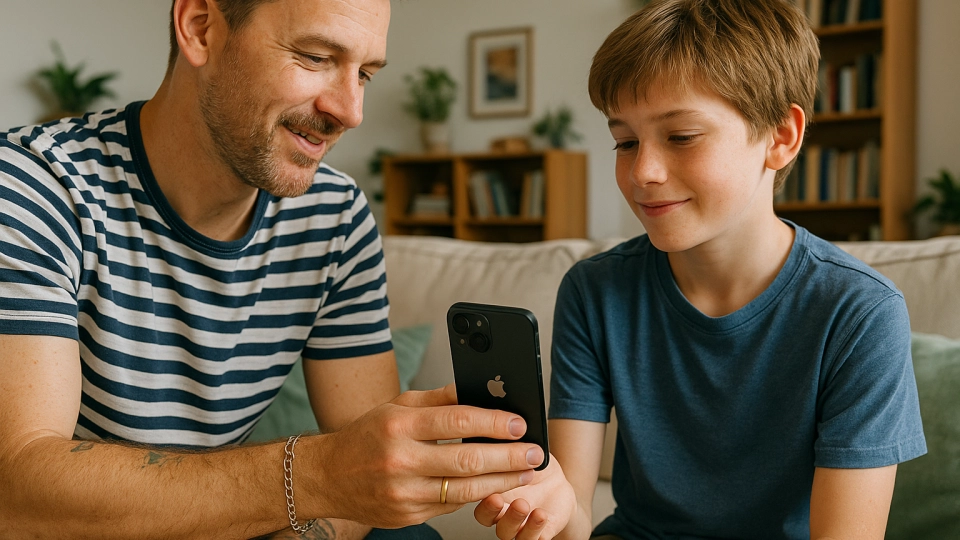When should a child get their first mobile phone? Opinions range widely—from those who recommend a phone for young preschoolers to parents who resist buying one until their kids are teenagers. The truth is there’s no universal age, because it depends above all on the child’s individual maturity.
A mobile phone today is not just a communication tool; it also grants access to the internet, social networks, and countless apps that shape a child’s daily life. Among classmates at school, it’s often seen as a norm and a marker of social status. Choosing the right moment to hand over a phone is therefore very important.
In this article, we take a close look at the key factors to consider if you’re thinking about getting your child a mobile phone. We’ll focus on signs of readiness, the ideal age range, potential online risks, device safety, and choosing the right phone.
How do you know your child is ready for their first mobile phone?
Using a phone requires responsibility and the ability to understand and respect the rules you set. Consider whether your child can stick to agreements in other areas of life.
You should be confident your child can follow limits and rules—for example, that they can put the phone away on their own, understand they shouldn’t respond to unknown contacts, and respect a daily screen-time limit. They should also grasp that a phone is an expensive device and that using it comes with costs.
It’s also essential that your child can handle frustration and other emotions linked to digital technologies. The online environment is often full of tense situations that can affect children more than we realize.
If you plan to give your child a first phone, set clear rules: how much time per day they can use it and whether the device must be stored outside the bedroom before sleep. Before buying, ask the school what rules apply to phone use there.
Also pay attention to whether your child can disengage for a while and set aside a phone (even a loaned one of yours) without feeling stressed, irritable, or angry. If they can’t yet do this, it’s a sign to wait a bit longer and gradually work on this skill.
Another indicator is mutual trust between parent and child. You should feel confident your child will come to you right away if they encounter a problem online—such as cyberbullying or a stranger contacting them.
Work together to create an environment of mutual respect, where your child understands they can share any concerns with you. If you think they would hide worries, it’s better to wait a while longer.
What is the ideal age to buy a mobile phone?
There’s no one-size-fits-all age that works for every child. Still, there are guidelines you can follow. Children up to about 8–9 years old don’t need a phone for online features, internet access, or social networks. At this stage, face-to-face communication with peers is most important. According to most research and recommendations, the earliest ideal age for a first phone with truly basic functions is around ten. By then, children are becoming more independent and may need a phone, for example to contact parents when traveling from school or activities. Most experts emphasize that a simple keypad phone is sufficient—one that allows calls, texts, and at most GPS location.
Preteens and early teenagers (12–13) usually own a phone. In most peer groups at that age, having a phone is now standard.
As parents, you’ll likely face pressure that other kids already have phones while yours does not. Talk with your child about the reasons for your decision. They need to understand it’s not a punishment. Ultimately, the decision to get a phone is yours.
Safety and rules for children’s mobile phone use
One of the biggest risks of mobile devices is cyberbullying. Children are sensitive to hurtful communication, so it’s crucial to prepare them for this reality. Explain that they’re never alone in facing cyberbullying and can always confide in you if it happens.
Limit your child’s phone use and restrict risky apps and social networks. They should also be prohibited from sharing sensitive personal information. Explain key concepts such as passwords, sharing contacts, and the dangers of fake apps and malware.
Choosing the right phone
A stylish phone may be tempting, but it should primarily meet practical needs. For younger children especially, a simple keypad phone is preferable—one that handles calls, texts, and perhaps GPS location.
If you’re getting a smartphone, choose one with a sturdy case, tempered glass, and long battery life.
The decision about when to get your child a first mobile phone shouldn’t be driven by trends or peer pressure, but by responsibility. Be patient and don’t give in to the first requests or pressure to buy.

